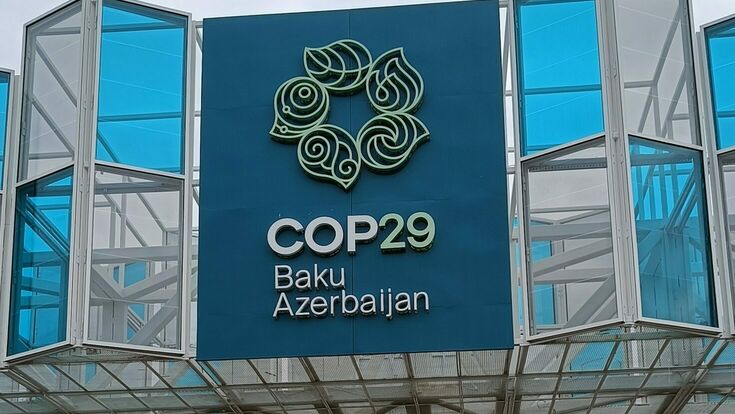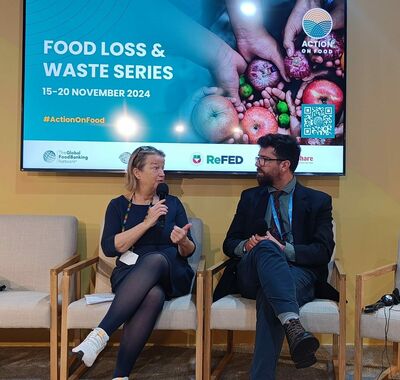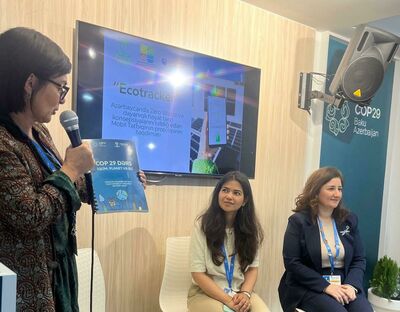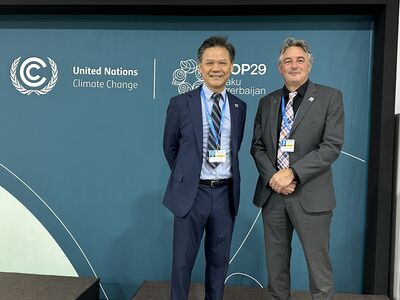ISWAatCOP : Impressions from the Waste and Resources Pavilion in the Green Zone at UNFCCC COP29

For the first time, waste is officially on the agenda of the COP Presidency. And this year’s climate conference held in Baku, Azerbaijan, included a number of events that discussed the potential of waste management to help mitigate climate change.
Methane contributes to half a degree of current warming and has 80 times the warming effect of CO2 over 20 years. According to the Global Methane Pledge, founded at COP26, to keep the 1.5°C limit within reach, methane emissions must drop by 30–60% by 2030 alongside CO2 reductions.
ISWA’s delegation hosted 15 sessions in the Green Zone, addressing many aspects of sustainable waste and resource management – from food waste, closing dumpsites and activating social enterprise within the sector to investing in innovation and clean marine environments.
With ISWA’s publication from earlier this year, the Global Waste Management Outlook 2 (GMWO2024), in hand, ISWA’s message and mission was clear. Research published in GWMO2024 shows that waste generation will continue to grow. To address this issue, ISWA’s Declaration for COP29 focused on four topics:
- Circular waste and resource management to address the triple planetary crisis
- Organic waste management towards a low-carbon future
- Set global waste and resource management goals
- Structure financing models and funding mechanisms
Related article: Putting Waste on the COP29 Agenda
Waste is officially on the COP agenda
The COP Presidency released its own COP29 Declaration on Reducing Methane from Organic Waste, with a very closely aligned message to ISWA’s Declaration. ISWA attended the high-level launch of the Declaration on 19 November 2024 in Baku. ISWA President James Law represented the Association at this meeting, standing in solidarity with national and organisational members of the community that convened to emphasise their continuing endorsement of the Global Methane Pledge and applaud the COP Presidency’s initiative to highlight the important role of waste management in reducing methane emissions. James urged the present delegates to “work together to turn waste into opportunity, pollution into progress, and methane reduction into a tangible climate victory. The stakes could not be higher.”
Inger Andersen, Executive Director UN Environment Programme, underscored the critical need for immediate action: “We need to see ambition, and we need to see action. Waste is growing, and methane from organic waste represents a significant challenge. Yet, by turning ‘waste’ into wealth, we can make meaningful progress.”
The session emphasised the need for immediate action, international collaboration and innovation to address methane emissions effectively.
Related article: News from Baku: It’s all about the money
“Financing for waste management – in general – is too low,” said ISWA’s Peter Simoes, who took part in the discussion at the GMH Pavilion. “Nevertheless, organic waste management is crucial in reducing methane emissions. And if you spend one dollar on waste management, you get much more than in other sectors.” The technology is already there, the effect would be immediate.
“From ISWA’s side, we are first and foremost happy that waste finally is mentioned in a Presidency Declaration,” said Anja Schwetje, Vice-Chair of ISWA’s Working Group on Climate Change and Waste Management at an event at the Action against Food Waste pavilion. “Moreover, it is good to see that the Declaration not only focuses on the mitigation of methane but includes waste management, soil remediation and food loss. This allows us to draw the line between climate mitigation and food loss. It is an emphasis on prevention and treating biowaste.” ISWA hopes that many countries endorse it.

Interventions in the Blue Zone at COP29
ISWA’s delegates participated in several sessions in the Blue Zone, bringing the perspectives of the waste and resources sector to panels and roundtables on climate action.
One such panel that ISWA was honoured to join was hosted by the UN Office for Sustainable Development (UN DESA) at the SDG Pavilion, focused on “Tackling Methane Emissions and the Waste Crisis through Data, Evidence-Based Policy and Finance”.
Aditi Ramola, ISWA’s Technical Director, was in good company, with Madagascar’s Minister of Environment and Sustainable Development, Max Andonirina Fontaine, and Godfred Fiifi Boadi from Ghana’s Ministry of Sanitation and Water Resources bringing their expertise and learning from their national overviews. Aditi shared findings from the Global Waste Management Outlook 2024, revealing that only 23 countries report comprehensive data on NDCs. Rural areas, in particular, face substantial challenges due to the lack of systems to collect and share waste data. Without accurate data, it is difficult to secure investment for scalable solutions or to develop tailored waste management plans.

To bridge this gap, initiatives such as learning tools, regional workshops and community-driven reporting systems are being developed to empower stakeholders and enhance data collection.
There is a clear call to action: data, capacity building and collaboration must go hand in hand to unlock the financing needed for waste solutions. Bankable projects that prioritise local context and sustainable outcomes will be essential to addressing both methane emissions and the broader waste crisis.
At the Azerbaijan Pavilion, the challenge of effectively managing plastic waste took centre stage, where ISWA joined an inspiring session exploring innovative opportunities. This session, attended by national ministers and international leaders from the private sector, shed light on the local and regional approaches that can combat a global issue.
James Law emphasised the power of collaboration between governments, organisations and academic institutions. James highlighted a number of ISWA’s interventions as an active contributor on several levels as evidence of the Association’s commitment to tackling plastic waste. The CLOCC project, for example, is an initiative that advocates for preventing and reducing marine litter and plastic pollution through integrated solid waste management systems, with improved municipal solid waste collection and increased recycling of suitable materials. On an institutional level, ISWA has been actively involved in the INC process to develop an International Legally Binding Instrument on Plastic Pollution by following the sessions of the intergovernmental negotiating committee that will define the structure and instruments of the treaty.

“The best kind of waste is the kind you don’t produce. For the waste that we have already created and continue to create, integrated management systems in both local and global contexts have to be at the fore of all our conversations and actions.” Aditi Ramola, Technical Director, ISWA
ISWA’s presence at COP29 has been one of many successes and learnings. From participating in a single session at COP26 in Glasgow to being at the high-level launch of a Declaration at this year’s COP – we’ve come a long way and can celebrate big wins for the waste and resource management sector.
ISWA thanks its sponsors and partners for making the Waste and Resources Pavilion at COP29 a reality. We look forward to bringing the same message and participation to COP30 next year.


